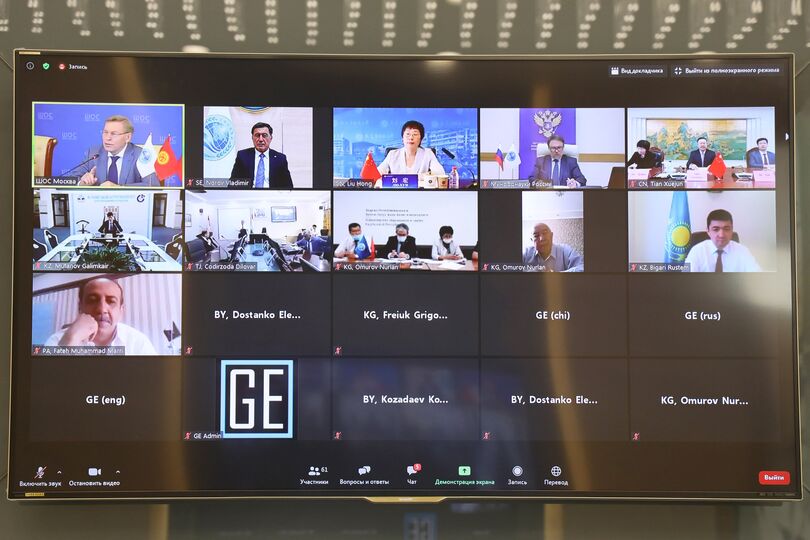SCO Secretary-General Vladimir Norov took part in the first meeting of the SCO University Coordinating Council that was held via videoconference on 30 June 2020, under Russia's chairmanship.
The SCO Secretary-General noted that SCO University plays an important role in training highly qualified professionals for jobs that are of priority interest for the economic and social development of the SCO member states and promoting integration processes in education, science and technologies.
"Since its establishment, SCO University has become an efficient platform for promoting cooperation in higher education across the SCO, strengthening inter-university links and honing methods to implement joint multilateral educational projects," Vladimir Norov stressed.
Currently, during the coronavirus pandemic, education institutions are partly or completely closed in the majority of the SCO member states and many students are studying remotely.
"Closing universities, colleges and schools as well as the emergency shift to online education have caused certain problems that pose a serious challenge to the education system during this crisis. At the same time, the new format opens up a wide range of opportunities and prospects for changing and improving our education systems. Distance learning has every chance of making a big breakthrough," the SCO Secretary-General said.
Vladimir Norov said that he is confident that SCO University presidents summed up the member states' consolidated experience in distance learning and will develop proposals for the draft SCO member states' cooperation project in this area while SCO University would become a reliable platform for it.
"Today the world is standing on the edge of unprecedented or, should I say, revolutionary technological changes. The second era of the digital revolution related to the synergy of artificial intelligence operating on the 5G high-speed network, and the development of robotics, bio and nanotechnologies will unite the digital and real spheres of the economy. It appears that the future belongs to those who can make effective use of the IT industry's enormous potential," Vladimir Norov noted.
In the same context, the Secretary-General focused on how important it is to develop and introduce educational programmes for training artificial intelligence and digital economy experts at SCO University.
Vladimir Norov expressed his confidence that SCO University, in cooperation with the SCO Secretariat and the SCO Youth Council, could make a substantial contribution to implementing the 2018 joint appeal to youth by the SCO heads of state and its implementation programme.
The Secretary-General reminded the audience that these documents envisaged establishing an association of young scientists within the SCO as well as holding educational, scientific and innovative exhibitions and competitions for young people in the member states, exchanging research publications, organising studies on topical issues concerning prevention of young people's involvement in terrorist and separatist activities and extremist organisations as well as a number of other undertakings.
It was noted that there is a need for establishing ongoing communication between the SCO University presidents and the SCO Secretariat in order to make full use of the existing mechanisms to implement the decisions made at the meetings of the SCO Heads of State Council and instructions regarding the development of higher education and youth issues.
The meeting participants focused on the 2019 Bishkek Declaration of the SCO Heads of State that emphasised the importance of further developing SCO University's activities, which includes involving interested SCO member states in the SCO Intergovernmental Agreement on SCO University. They expressed hope that when India and Pakistan join the Agreement, the geography and areas of SCO University's cooperation would expand in the common interests of the prosperity of the SCO nations.
Participants in the videoconference included the following Coordinating Council members: Deputy Minister of Education and Science Rustem Bigari and President of Al-Farabi Kazakh National University Galimkair Mutanov representing Kazakhstan; Deputy Minister of Education Tian Xuejun and President of Dalian University of Foreign Languages Liu Hong representing China; Deputy Minister of Education of Science Nurlan Omurov and President of Isanov Kyrgyz State University of Construction and Architecture Akymbek Abdykalykov representing Kyrgyzstan; Deputy Minister of Science and Higher Education Dmitry Afanasyev and President of Peoples' Friendship University of Russia Vladimir Filippov representing Russia; and Deputy Minister of Education and Science Dilovar Kodirzoda and President of Avicenna Tajik State Medical University Gulzoda Makhmadshoh representing Tajikistan.
SCO University is a network of SCO higher educational institutions that have united to train highly qualified professionals in the priority areas for the SCO member states' economic and social development.
SCO University was established at the initiative of President of Russia Vladimir Putin during the SCO Heads of State Council meeting in Bishkek on 16 August 2007.
SCO University is comprised of 79 higher educational institutions, including 14 from Kazakhstan, 23 from China, 8 from Kyrgyzstan, 22 from Russia, 11 from Tajikistan and 1 from Belarus.
Between 2010 and 2019, 1,413 students completed training at Russian educational organisations that are part of SCO University.
